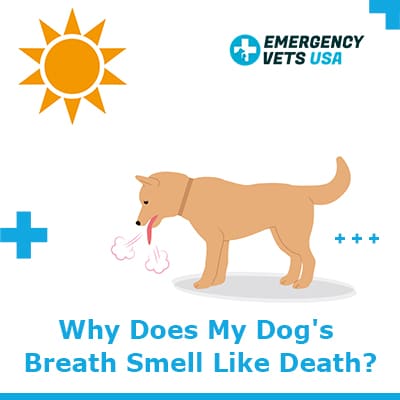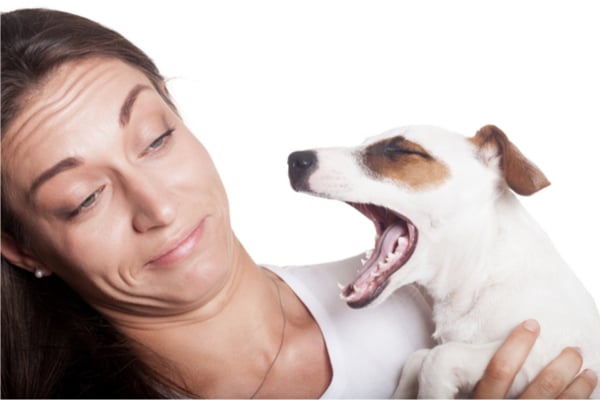Why Does My Dog’s Breath Smell Like Death?
No matter how much we love our furry friends, we do not love their bad breath.
A dog with bad breath can make it challenging to truly enjoy their company, especially when they want to offer you kisses.
So what can make a dog’s breath smell like death?
In this article we will discuss the most common causes of halitosis in dogs, and our favorite tips on how to banish their bad breath for good!
What Is Halitosis In Dogs?
Halitosis in dogs refers to the presence of a foul odor coming from the oral cavity.
While halitosis can be a diagnosis in itself, it is always due to an underlying cause.
Our dog’s breath may not always be pleasant, but it should never be overpowering enough to get our attention.
If your dog is struggling with halitosis that makes it hard to enjoy your time cuddling on the couch, it is time to get to the bottom of what is causing their bad breath.
What Causes Bad Breath In Dogs?

We have all heard the term “dog breath” being used to describe a pup with halitosis.
This term can lead us to think all dogs have less than pleasant breath, when that is not the case at all.
Though a dog’s breath may never smell like roses, a pungent odor can point to an underlying cause within your furry friend’s mouth.
To help you get to the bottom of your dog’s bad breath, let us discuss the most common causes of halitosis below.
Dental Disease
The most common cause of bad breath in dogs is due to dental disease or periodontal disease.
Dental disease is considered the most common health condition treated in dogs worldwide, with almost 80% of dogs having it by age 3.
When a dog suffers from periodontal disease, they experience a buildup of plaque and tartar on their teeth.
Though it only takes a few days for plaque to mineralize and become rough tartar, the result can cause years of pain and odor if it is never addressed.
As the plaque on a dog’s teeth begins to age, it will lead to bacteria build up within the mouth and gum inflammation (gingivitis).
The buildup of bad bacteria can begin to take over within the mouth, leading to dental destruction that is challenging to come back from.
Not only is this process uncomfortable for our furry friends, but it can cause a bad case of halitosis.
When the bacterial flora within the mouth is overwhelmed by destructive bacteria, the dog’s breath will begin to smell like sulfur or the presence of rotting tissue.
This smell will only continue to get worse the more their dental disease progresses.
This can then lead to systemic issues with their overall health.
Severe cases of periodontal disease can lead to a buildup of bacteria within the bloodstream, causing damage to multiple organs in the body.
Dental disease has been tied to kidney and heart damage, making it so important to stay on top of your dog’s dental health.
Dental disease in dogs can present as difficulty eating food, red or bleeding gums, blood in their water bowl, blood on bones or treats, bad breath, loose teeth, and facial swelling.
If your dog is displaying any of these symptoms, it is time to get them in for a dental exam.
Oral Foreign Bodies
Another possible cause of bad breath in dogs is due to oral foreign bodies.
A foreign body is simply anything that does not belong in that area, referring to objects that become lodged in the teeth or gums.
Our dogs are known to eat things they should not, giving inedible objects the chance to cling to their teeth or become stuck in the mouth.
Not only can inedible objects get trapped in a dog’s mouth, but hard kibble and bones can do so as well.
When any kind of foreign material is trapped in a dog’s mouth, it will begin to collect bacteria.
This bacterial buildup can create an overpowering odor in the dog’s mouth, even mimicking the smell of rotting tissue.
This is where we think our dogs breath smells like death.
It is not only important to remove the foreign body to alleviate the smell, but to help prevent any serious infections within the mouth.
Though this is not always the case, dogs with oral foreign bodies will often display a few common symptoms.
You may notice foul breath, pawing at the mouth, hesitance to eat, attempting to eat then stopping, having a hard time chewing, blood coming from the mouth, and even crying out when their mouth is touched.
If your dog is experiencing any of the above symptoms, it is best to have them seen by your veterinarian for further care.
Kidney Disease
Kidney disease is another potential cause of halitosis in our canine friends.
While kidneys are the most impacted organ in this disorder, a dog’s oral health can be affected as well.
When a dog is in the late stages of kidney disease, it becomes challenging for their body to filter out toxins.
Diminished kidney function can cause systemic toxins to build up in the body, leading to a build up of these chemicals within the mouth as well.
The presence of this buildup can cause a metallic smell in the mouth itself, but can lead to even more odor if they begin to develop ulcers.
The toxins in the mouth will begin to cause painful ulcers within a dog’s mouth, creating a breeding ground for smelly bacteria.
Kidney disease can be a painful process for our furry friends to go through, especially when it has gotten to the point of causing infection within the mouth.
If a dog is in the late stages of kidney disease, you will likely notice other concerning symptoms aside from bad breath.
Kidney disease in dogs can cause increased thirst, increased urination, weight loss, vomiting, lethargy, and anorexia.
If you are concerned about your dog having kidney disease, it is best to seek advice from your veterinarian.
Diabetes
While this is not the most common cause of bad breath in dogs, diabetes can cause a sudden change in a dog’s breath.
A dog with diabetes will experience elevation in their blood glucose (blood sugar), which in turn causes an overpowering sweet scent to be present in their breath.
This smell in their breath can even smell like acetone in severe cases of diabetes, specifically when a dog reaches diabetic ketoacidosis.
If your dog is struggling with diabetes, there are a few other symptoms that may be present as well.
Diabetes in dogs can cause increased thirst, increased urination, chronic UTI’s, weight loss, decreased appetite, and skin infections.
If you are concerned about your dog having diabetes, we suggest you contact your veterinarian for further care.
Oral Tumors
Dogs can develop tumors anywhere on their body, including inside of their mouth.
These tumors can protrude from the bones within their mouth, as well as the tissue that lines their gums.
As these tumors grow within their mouth, they become more of an obstruction to normal chewing and drinking.
This can cause a dog to bite into these tumors, causing them to open or become ulcerated.
When these tumors ulcerate or become damaged, they can begin to collect bacteria.
Being an open sore in the mouth, these areas will collect food debris and bacteria of all kinds.
The presence of bacteria is what makes these tumors so smelly, as well as if the tissue in the tumor begins to necrose (die).
If bacteria and dead tissue is present, this can result in some seriously foul breath.
Oral tumors in dogs will usually be accompanied by bad breath, drooling, bloody drool, difficulty eating, and facial swelling.
If your dog is displaying any of the above symptoms, it is important to contact your veterinarian as soon as possible.
While it cannot be said for all oral tumors, many of them are cancerous.

How Can I Get Rid Of My Dog’s Bad Breath?
If your dog is suffering from bad breath, you are likely searching for the best ways to rid the stench for good.
The most effective way to eliminate the smell is to treat the exact source of the problem, but there are a few other tips that we can offer.
Maintaining Their Dental Health
If your dog’s death smelling breath is due to dental disease, the only way to resolve the issue is by offering them the dental care they need.
Your veterinarian can perform a dental exam that assesses their level of periodontal disease, and can perform a dental procedure to remove as much of the tartar as possible.
They can then suggest the best dental care going forward, as well as how often they will need dental cleanings in the future.
You can also begin to implement daily tooth brushing with pet approved toothpaste.
This will help your dog fight off plaque for good, as well as attack their bad breath at the source.
Offering Chew Toys & Dental Bones
Another great way to maintain your dog’s oral health is by helping their teeth stay nice and strong.
Chew toys can help to prevent plaque and tartar from developing on the teeth, as well as chip off loose tartar that is already present.
Dental bones can provide this same service, but may even freshen their breath with each chew.
Offering High Quality Food
A quality diet can offer so much benefit for our canine companions.
Not only can nutritious food support their systemic health, but it can promote optimal dental health as well.
Low quality food with high amounts of fat and sugar can promote bacteria growth in the mouth, as well as cause our dogs to be gassy as they digest.
Unhealthy diets can also lead to systemic disease in our furry friends, many of which can impact dental health in the long run.
Be sure to have all diets that you offer your dog approved by your veterinarian.
Keep Up With Vet Exams
One of the best ways to treat and prevent bad breath in dogs is by keeping up with routine vet visits and diagnostics.
Yearly trips to the vet can not only diagnose medical issues early on, but potentially prevent them from happening all together.
A well rounded care plan will offer your pup the best line of defense against developing disease.
Final Thoughts
Halitosis in dogs is a smelly problem with multiple causes.
Be sure to review the information that we discussed above, and you can better protect your dog against bad breath in the future.

My name is Amber. I am a dedicated animal lover that turned my passion into my career. I am a Licensed Vet Tech with 12 years of experience in veterinary medicine, but I recently took my career online to help spread accurate information on animal care. With how vast the online world is, I have a strong desire to ensure that the reader always walks away with helpful pet advice. With the experience I’ve gained from my time in this field, I have been able to travel the world, offering my services to as many animal rescues as I can find. If I am not at my laptop, or back home visiting family, you can find me somewhere in the world, cuddling every furry friend that I can find! More About Us
